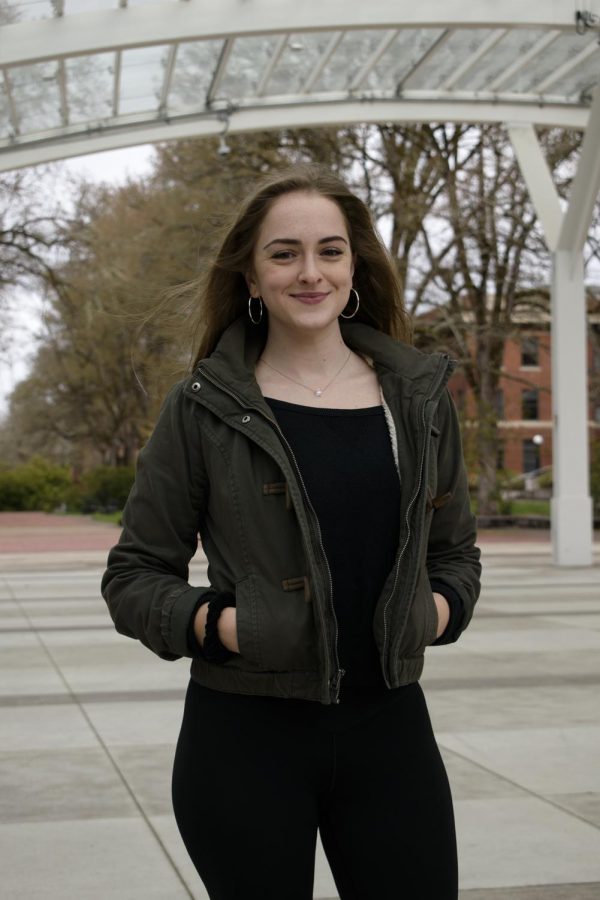Annual Out of the Darkness event aims to bring awareness to mental health
April 12, 2021
Content warning – story contains mention of depression and suicide.
1,100 college students die by suicide each year and students have reported declining mental health during the pandemic. An Oregon State University event seeks to increase awareness and prevention for these issues.
OSU is hosting the annual Out of the Darkness Virtual Walk in conjunction with the American Foundation for Suicide Prevention on April 17 from noon to 1 p.m.
The event seeks to raise awareness and funds for suicide prevention throughout the community and will include community speakers, an honor bead ceremony and memorial submissions.
According to Tess Webster-Henry, the OSU Counseling and Psychological Services coordinator for Mental Health Promotion and Suicide Prevention, college students are strongly affected by depression and suicide.
Suicide is currently the second highest cause of death for those in the age group of 15 to 24, and 10% of college students report considering suicide in the past 12 months, according to Webster-Henry. Forty-five percent report feeling depressed to a point of an inability to function in the past 12 months.
Though data on depression and suicide rates for 2020 is limited, the AFSP and other suicide prevention organizations are closely monitoring preliminary statistics, especially because of the stressful nature of the pandemic.
Data from early on during the pandemic suggests suicide rates did not rise and maybe even decreased. However, these organizations remain cautious about these early statistics and are mostly uncertain about rates so far during the pandemic.
Lucianne Ryan, the chair for the Out of the Darkness Virtual Walk and program and education services chair for the AFSP’s Oregon chapter said the pandemic and limited social interaction may have had an effect on people’s mental health.
“We do know that social contact and community support are vital resources for suicide prevention, and the pandemic has severely impacted the way we connect with others,” Ryan said. “It’s more important than ever that we reach out to our loved ones and remind people that they’re not alone. The fact remains that suicide is a complex issue caused by both biological and environmental factors.”
Wellness Coordinator and embedded clinical psychologist for OSU’s Carlson College of Veterinary Medicine Alex Rowell added that the mental health of Generation Z (1997-2012) has worsened since the beginning of the pandemic.
A 2020 survey conducted by the American Psychological Association found that 34% of the Gen. Z population reported worse mental health since the inception of the pandemic.
Gen. Z is more likely to report experiencing common symptoms of depression as well, and 67% of Gen Z adults in college say the pandemic makes planning for the future feel impossible.
The mix of being a college student during the pandemic has proved to be difficult for Gen Z according to Rowell, including at OSU.
“At OSU the stressors students face have been life changing given significant alterations in schooling and socializing with their peers,” Rowell explained. “…When I work with our professional students, a common theme I hear from them is yearning to be able to connect with their classmates and friends. Research has proven that social connections can serve as a significant buffer against depression and other mental health conditions.”
Rowell said one of the first steps in the prevention and education around mental health issues, including suicide, is “the ability to destigmatize and normalize help seeking behavior.”
At the CCVM, Rowell said they work to accomplish this step by hosting quarterly suicide prevention talks and presentations and participating in the Out of the Darkness Walk. Additionally, the CCVM has recently been increasing its efforts to advocate for wellness and mental health resources.
“The CCVM has also seen a cultural shift when it comes to striving to achieve more of a school/life balance and advocating for positive well-being,” Rowell said. “This is evident by the dean of the college allocating funding for my position, our wellness week that we have every year that is put on by our students and clubs focused on supporting the mental health of our professional students.”
Ryan agreed that destigmatization and normalization of mental health struggles are necessary to improve the public’s wellbeing.
“Suicide prevention starts with each and every one of us,” Ryan said. “The more open and honest we are with our friends and family about our mental health, the more likely we will feel supported and connected with a community. We know that connection is one of the best ways to prevent suicide; talk with your friends and family more regularly and help end the stigma around mental health.”
Webster-Henry stressed the importance of mental health training. OSU community members can take CAPS’ Kognito: Recognizing and Supporting Students in Distress Training for Staff, Faculty and Student Assistants.
“OSU students today face increasing pressures that can lead to emotional distress, depression, anxiety, substance abuse and even thoughts of suicide,” Webster-Henry said. “This is never more true than now with the additional stressors of police brutality, racism and a global pandemic. Faculty, staff and the student assistants we employ may be in the best position to notice when a student needs additional support.”
Faculty and staff, as well as student assistants, can access online training to recognize and support OSU students in distress through this CAPS program.
Rowell also mentioned the necessity of funding for suicide prevention and mental health programs, specifically for marginalized communities.
“I believe having someone either at the university or within the [CCVM] specifically to raise awareness and funding around mental health issues is essential to us moving forward and setting up appropriate resources for [Black, Indigenous and people of color] students and survivors along with our OSU student population at large,” Rowell said.
Ryan said the Out of the Darkness Virtual Walk is a great place to start for those who are new to becoming involved in the prevention and education of depression and suicide.
“Attending the live streamed event on April 17 is a great way to get started,” Ryan said. “On a larger scale, the OSU institution must demonstrate its commitment to saving lives by supporting mental health-related events, clubs, and organizations. We have a duty to allocate more resources to mental health services for all students and faculty. One life lost is one too many; help the #BeavsStopSuicide.”
Community members are encouraged to register now for the Out of the Darkness Virtual walk event to receive communications about the livestream broadcast in advance.
OSU CAPS provides 24/7 crisis support for students at 541-737-2131, and also offers individual and group counseling to students as well as other programs focused on mental health and wellness.
Outside of OSU, the National Suicide Prevention lifeline is available at 800-273-TALK, and the Trevor Project’s Lifeline is 1-866-488-7386. There is also an option to text OREGON to 741-741 for crisis support.












































































































